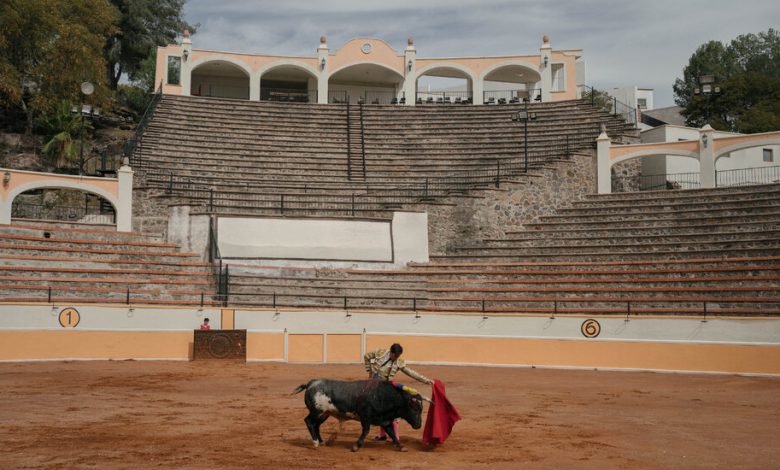Bullfighting in the Arena and Battling Outside of It

Times Insider explains who we are and what we do and delivers behind-the-scenes insights into how our journalism comes together.
In November, a colleague at The New York Times invited me to an exhibition tennis match between Carlos Alcaraz and Tommy Paul at a historic venue: La Plaza México, the largest bullfighting arena in the world.
The arena, which opened in Mexico City in 1946, seats 42,000 and dwarfs the stadium next door, home to the professional soccer team Cruz Azul. Nearly 20,000 people attended the tennis match and the massive venue still felt empty. As I walked around, I saw many reminders of the arena’s history — statues and images of bullfighters — but no signs advertising future bullfighting events.
After the match, I learned that a federal judge had banned bullfighting at La Plaza México in 2022, following a legal challenge from a human rights group that argued the “degrading” treatment of bulls was detrimental to society. Supporters of bullfighting argue that the practice is an important part of the country’s culture and economy and has been for centuries.
I moved from New York to Mexico City last April to cover sports and culture in Latin America and had plenty to learn about the region and its traditions. My article on bullfighting, which was published online this month, detailed many legal battles that played out in real time.
My reporting began in earnest in January, a month after the Mexican Supreme Court overturned the ban on bullfighting at the venue. I knew instantly that there was a story, one that would spur debate and perhaps even surprise.
Many people associate bullfighting with Spain, a country that popularized the practice. So I figured a portion of Times readers would be intrigued to learn that the globe’s largest bullfighting venue was in Mexico City, the largest bullfighting city in the largest bullfighting country of the world. With the practice’s popularity waning in other countries and five of Mexico’s 31 states prohibiting it since 2013, I found it counterintuitive that bullfighting was now returning to an emblematic place.
We are having trouble retrieving the article content.
Please enable JavaScript in your browser settings.
Thank you for your patience while we verify access. If you are in Reader mode please exit and log into your Times account, or subscribe for all of The Times.
Thank you for your patience while we verify access.
Already a subscriber? Log in.
Want all of The Times? Subscribe.